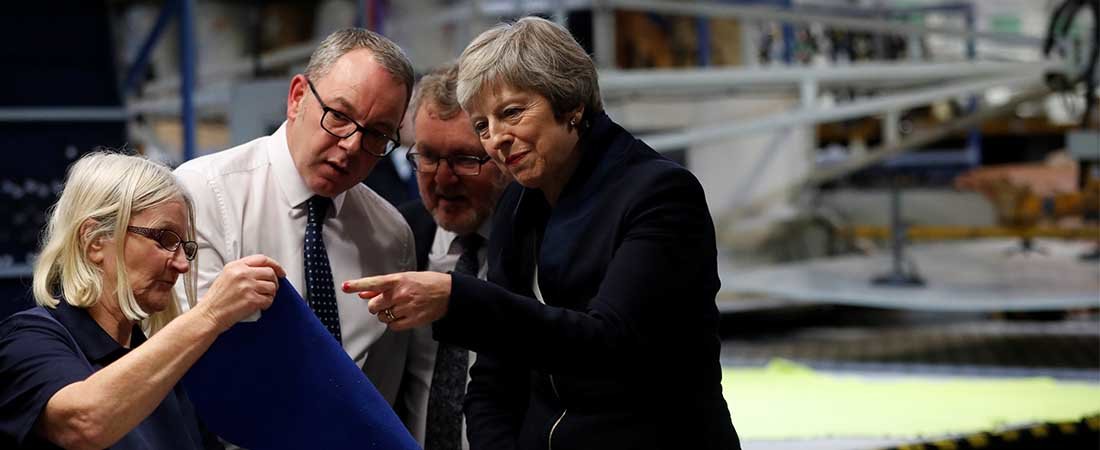Downing Street is in campaign mode, supportive MPs are being identified and stakeholders lined up for endorsements. There’s a daily themed grid in place, around which messaging will (in theory) be devised and delivered. Attempts to wrap this around a core theme or motif will be made, the basis of which we are already seeing (though it’s no ‘Long Term Economic Plan’). A General Election? No. Just an unprecedented deal and the need for an unprecedented political fix, to which the solution seems to be winning the hearts and minds of the British public.
In what might be a tacit acknowledgement of the Prime Ministers diminishing influence within the bubble, Theresa May is taking her message to the country. Her team are deploying unprecedented ‘peace time’ tools, in what looks like the basis of a General Election campaign. Though no battle bus has yet to emerge, the hill which it must climb to turn a largely negative media narrative around before 11th December is not small.
Though somewhat unprecedented due to the political firefight around her, the Prime Minister will no doubt be haunted by ghosts of campaigns past. We will no doubt be reminded of George Osborne and David Cameron dedicating considerable Government resource to travelling around the country promoting the argument for remain (or spreading Project Fear depending on your attitude at the time). Cameron and Osborne filled atriums and factory floors, aided by a willing network of corporates prepared to speak up on the issue to avoid the position we’re now in as a nation.
Despite the strategy being in place –the resource behind this approach may be called into question. The PM’s 2017 election campaign suffered due to the lack of the ‘rollerdex effect’ of a normally well-nourished business community being starved of access and favour during her first year in power. Very few doors were opened at such short notice despite her likelihood of an easy win (or so we thought). Moves have been made to remedy this since, but there’s no arguing businesses enjoy the warmth of hosting a likely winner rather than the cooling effect of an underdog whose future is part of the very debate going on.
So no battle bus, but an apparent objective of engaging the public beyond London (no doubt in areas where ‘switchable’ MPs with loose majorities might be swayed by a move in support of the Government’s position). The format of Cameron factory Q&As may still feature (albeit with fewer corporate favours to call in), but we are told a key focus will be engaging local and regional media as the conduit to altering public opinion below the surface. Both media interviews and Q&As haven’t sat within the comfort zone of this PM, unlike her predecessor, but there’s no denying her personal and individual appeal plays in more intimate settings. The challenge will be engineering enough of those to make a credible difference, then making them play out positively on the larger stage of the debate itself.
It’s not just media access and factory Q&As where the Prime Minister seems to be willing to take a risk. It’s now looking more and more likely that the PM is prepared to take on Jeremy Corbyn in a live TV debate on the issue. Downing Street advisers will most certainly be banking on changeable Labour positions on the EU for Corbyn and his team to be able to further undermine his credibility on the issue. Shining the sterile studio lights, they gamble, will show off the Labour Party’s varied position to the public, boosting the credibility of May’s deal. The now open discussion about the PM’s willingness to debate in this way also fits into their newly established approach of engaging voters through the media – in the last fortnight May has spoken to LBC and FiveLive listeners on call-in shows. If anything these will have proved the perfect stress test for a model that could be duplicated on live TV.
As with pushing any spokesperson forward in any format on any issue, the risk of being caught out has to be less than the potential wins gained from furthering your cause – but May has to appeal to those beyond the Westminster echo chamber given her influence there seems to be dwindling. In that case – with noticeable inconsistencies in Labour’s approach, and with a marathon to run in terms of converting negative messages into a more optimistic vision for the future what does she have to lose by going further beyond her comfort zone and tackling the issue on the road, and in theory live on TV…?
Click here to subscribe to Portland’s weekly Brexit round-up to receive the best stories you might have missed.

